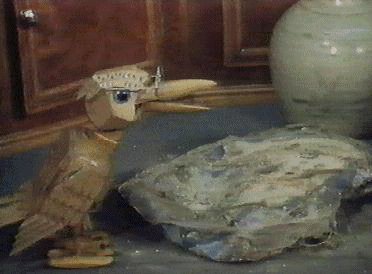GREAT HEROES OF LIBRARY SCIENCE:
PROFESSOR YAFFLE -
![]()
"And last of all, Professor Yaffle, who was a very distinguished old woodpecker
He climbed down off his bookend and went to see what it was that Emily had brought."
![]()
Yaffle, clearly is one of the greatest intellects of this and any other age, only he can unravel such baffling mysteries as the piecing together of old china to form an ancient Chinese wise-man, the nature and meaning of ballet and the mysterious mouse mill. BUT from where does Professor Yaffle, the carved wooden book-end in the shape of a woodpecker, get his knowledge from? What exactly he a Professor of?
The answer baffled leading scholars the world over till the brilliant paper of Andrew George Cox Esq, "Yaffle, Professor of LIBRARY SCIENCE", appeared in The Journal of Strange Library Science, 12, (1987), 56-72. His careful examination of library school records revealed that Yaffle had graduated with honours from the University of London's Library school in 1925, studying with renowned Indian librarian, S. R. Rangnathan.
Yet the real question must be, who was the person, behind the expert librarian persona Yaffle presented to the world. S. R. Rangnathan remembered Yaffle in an interview recorded in 1967:
Yaffle was a strange old bird, he could be a bit wooden headed at times, but his insight and grasp of the essential principles of librarianship were matchless. We often used to go down to the Black Lion together after cataloguing lectures and Yaffle would expound on the correct application of Confucian thinking to libraries over a pint of porter. I remember him saying in argument over the proper dimensions of a shelf stack "You can't make chocolate biscuits out of bread-crumbs and butter beans," as if he was standing right here before us now.
Yaffle's brilliance was soon noted and he soon became a Professor through sheer academic brilliance. His lectures were always crowed and the students loved him, frequently playing practical jokes to try and catch him out, baiting old Yaffle as they called it. One famous incident included attempting to convince Yaffle that some of his students were so lacking in funds they were forced to live in a shoe. Other friends of Yaffle, remember his love of the arts, and ballet in particular. Even though he could seem proud and aloof everyone always knew Yaffle's heart was in the right place. His liking for ballet led in the late twenties to his tragic love affair with a Prima Ballerina. Erasmus Sneedwink, one of Yaffle's closest colleagues, remembers:
"Yes, that girl simply tied him in knots. They would often duet with each other down the stacks. When she left him, he buried himself in his card catalogue and bottles of port in a desperate attempt to forget. Eventually it worked and he lost all memory of her, and in fact most of his memory of reality."

All these personal problems couldn't stop Professor Yaffle's stream of brilliant writing on library science culminating in his magnum opus "The Principles of Chinese Librarianship in the Han and Sung Dynasties." In particular, his famous section on the wise Librarian of Ling-Po established that the Chinese had developed a decimal classification system based on the I Ching inscribed on a series of turtle shells, millennia before Dewey.
Yaffle then clearly is the king of information choreography. His mastery of the art of bibliographical citation derives from not only dwelling next to books, but being part of the structure which holds books upright. Thus like Professor Yaffle, all librarians must strive to become one with the library in which they serve. Then they can be like Professor Yaffle who so easily can provide the mice with any information they care to name from the books, meticulously catalogued, (in CC of course) behind him. Let us leave the final word to Sneedwink: "Yaffle was a chip off the old block, they don't make librarians like that any more."
![]()
And of course when Bagpuss goes to sleep, all his friends go to sleep too
The mice were ornaments on the mouse-organ
Gabriel and Madeleine were just dolls
And Professor Yaffle was a carved wooden bookend in the shape of a woodpecker